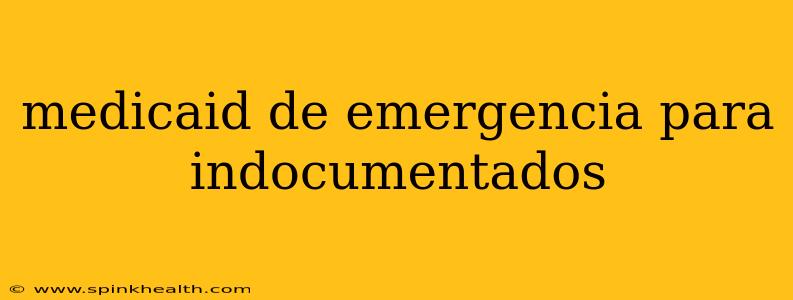Navigating Emergency Medicaid for Undocumented Immigrants: A Comprehensive Guide
The question of healthcare access for undocumented immigrants in the United States is a complex and often emotionally charged one. While federal law generally restricts access to many government-funded healthcare programs, some states offer limited emergency Medicaid coverage. This isn't a blanket entitlement, and the specifics vary significantly by state. Let's unravel the intricacies and shed light on this often-misunderstood aspect of the US healthcare system.
Imagine this scenario: Maria, an undocumented immigrant working tirelessly to support her family, suffers a severe fall while at work. She needs immediate medical attention, but the fear of insurmountable medical bills looms large. Can she access emergency medical care? The answer, while not a simple yes or no, depends heavily on her location and the specific circumstances.
What is Emergency Medicaid?
Emergency Medicaid, in the context of undocumented immigrants, refers to the limited provision of emergency medical services covered under state Medicaid programs. Crucially, this is not comprehensive healthcare coverage. It typically covers only emergency medical services deemed necessary to stabilize a life-threatening condition. This might include things like:
- Trauma care: Treatment for injuries sustained in accidents.
- Stabilization of acute conditions: Addressing immediate life-threatening illnesses, such as heart attacks or strokes.
- Emergency surgery: Procedures required to save a life or prevent serious harm.
It's crucial to understand that Emergency Medicaid does not usually cover preventative care, routine check-ups, or non-emergency treatments. The services provided are strictly limited to addressing immediate, life-threatening situations.
Which States Offer Emergency Medicaid to Undocumented Immigrants?
This is where things get complicated. There's no single national policy. Each state has its own Medicaid program and regulations, and their policies regarding emergency care for undocumented immigrants vary considerably. Some states offer limited emergency Medicaid, while others do not.
To determine eligibility, you MUST contact your state's Medicaid agency directly. Websites like the Centers for Medicare & Medicaid Services (CMS) can provide links to individual state programs. Don't rely on outdated information found online; always consult the official state resource for the most up-to-date and accurate details.
What are the Eligibility Requirements?
Even within states that offer emergency Medicaid, specific eligibility criteria may apply. These criteria may include:
- Proof of residency: Demonstrating you reside within the state.
- Proof of emergency: Providing evidence that the situation requires immediate medical intervention.
- Income limits: While emergency Medicaid generally doesn't have strict income limits like other Medicaid programs, some states may have indirect requirements.
Again, checking directly with your state’s Medicaid agency is essential.
What is NOT covered under Emergency Medicaid?
As mentioned earlier, Emergency Medicaid for undocumented immigrants is extremely limited in scope. Expect that the following will likely not be covered:
- Follow-up care: Treatments required after the immediate emergency is stabilized.
- Routine check-ups: Preventative care or wellness visits.
- Non-emergency medical services: Treatments for non-life-threatening conditions.
- Prescription medications (except in very limited, emergency situations): Medications typically aren't covered unless directly related to the immediate emergency.
What are my other options for healthcare?
If you are an undocumented immigrant facing a health crisis, exploring alternative options is crucial:
- Community health clinics: Many non-profit organizations offer low-cost or free healthcare services to uninsured individuals.
- Hospital financial assistance programs: Hospitals often have programs to help patients manage medical bills.
- Charitable organizations: Many charitable organizations provide assistance with healthcare costs.
Navigating the healthcare system as an undocumented immigrant is challenging, but understanding the limited options available through emergency Medicaid, coupled with exploring alternative resources, can improve access to essential care during emergencies. Remember to always consult your state's Medicaid agency for accurate and up-to-date information. Your health and well-being are paramount, and accessing the right resources is critical.

